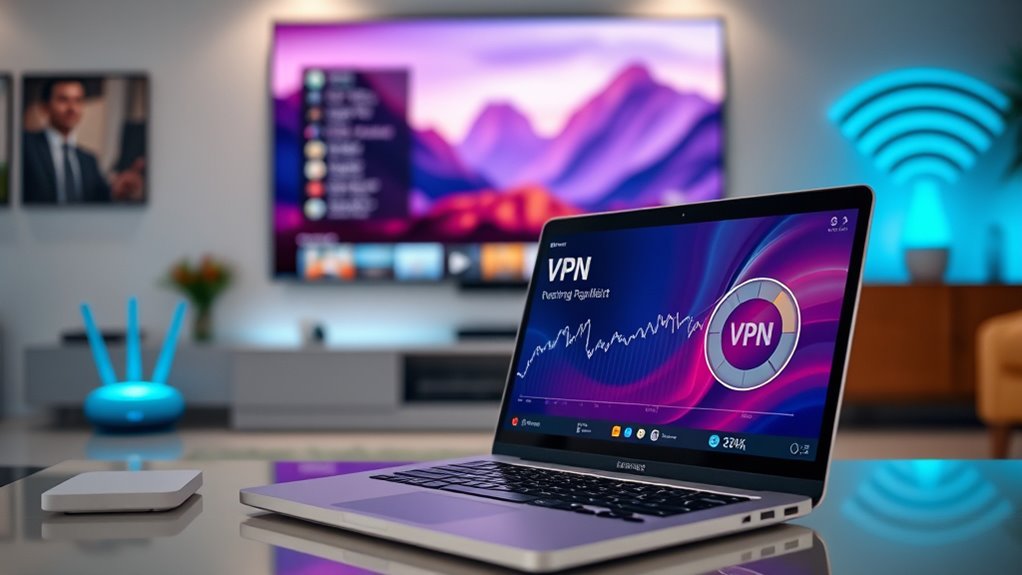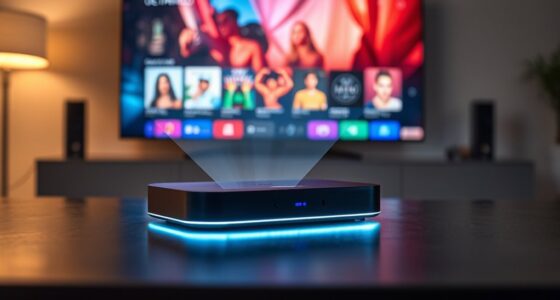Many believe VPNs cause severe slowdowns, especially during 4K streaming, but this is a myth. Modern VPNs use optimized servers, protocols like WireGuard, and nearby locations to maintain high speeds. Speed loss mainly comes from server congestion, distance, or hardware limits, not encryption itself. By choosing the right VPN and server, you can enjoy smooth, high-quality streams. Keep exploring to discover how to minimize speed issues and maximize your streaming experience.
Key Takeaways
- Modern VPNs with optimized protocols like WireGuard minimize speed loss during 4K streaming.
- Server distance and congestion, not encryption alone, mainly determine VPN speed impacts.
- Many speed reduction myths stem from outdated info; current VPN technology supports high-quality streaming.
- Choosing nearby, less crowded servers significantly improves VPN performance for 4K content.
- Proper setup and server selection can eliminate or greatly reduce VPN-induced streaming delays.
Understanding How VPNs Affect Internet Speed
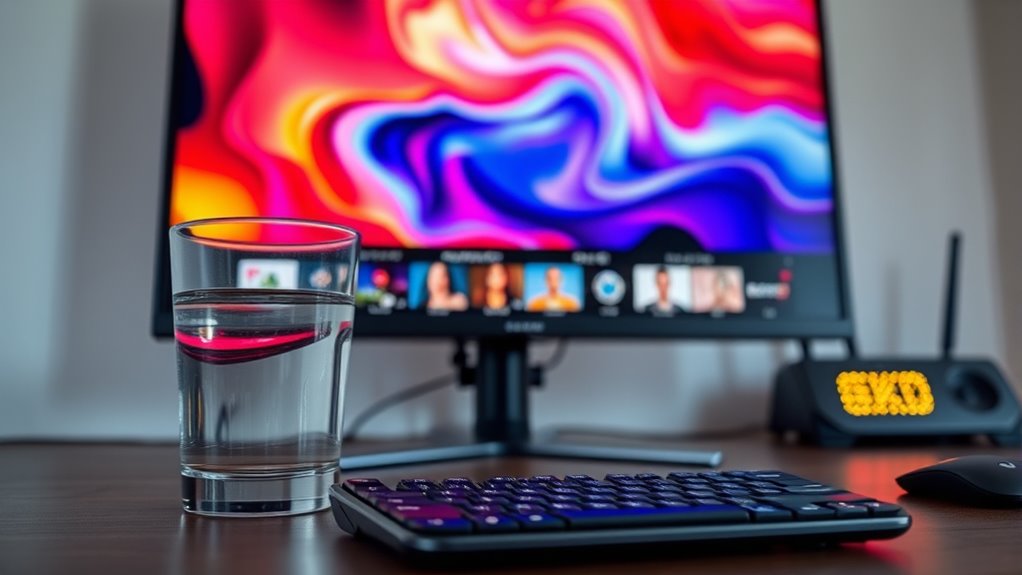
When you connect to a VPN, it often slows down your internet speed because your data has to travel through the VPN server before reaching its destination. This process introduces encryption overhead, which is the additional data needed to secure your connection. Encryption guarantees your information stays private, but it requires extra processing, slightly reducing speed. Additionally, server congestion plays a significant role; when many users access the same server simultaneously, it can become overloaded, causing delays. These factors combined mean that your internet experience might feel slower, especially during peak usage times. However, understanding these elements helps you recognize that some speed loss is unavoidable, but choosing less congested servers and optimized VPNs can minimize the impact. Moreover, being aware of sound healing science can help you appreciate how technology influences our perception of well-being and performance during digital activities. For example, selecting VPN servers closer to your physical location can help mitigate some of the latency issues caused by geographical distance.
Common Myths About VPN Speed and Streaming
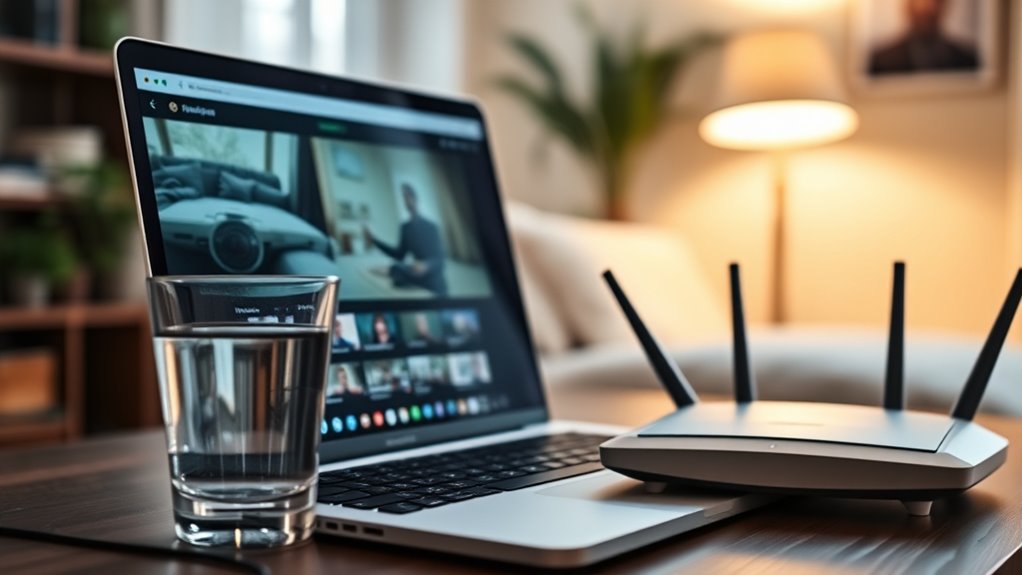
Many people believe that using a VPN will drastically ruin their streaming experience, but this isn’t always true. While some think VPN security slows you down considerably, modern VPNs are optimized for speed, especially for high-quality streaming like 4K. Common myths include the idea that all VPNs cause severe lag, that VPNs are unsafe, or that they compromise user privacy. In reality, a reputable VPN can protect your user privacy without sacrificing much speed. Imagine a smooth, buffer-free stream, a secure connection hidden behind encryption, and the freedom to access content worldwide—all without noticeable delays. These myths often stem from outdated info or misconceptions about VPNs, ignoring how top providers now prioritize both security and speed. Understanding the broader scope of Ethical Hacking can also shed light on how security measures are evolving to enhance user experience without sacrificing performance. Additionally, advancements in VPN technology have led to faster servers and optimized protocols that further reduce potential speed drops during streaming. Moreover, network optimization techniques are increasingly being integrated into VPN services to maintain high speeds even during intensive data transfers. Furthermore, ongoing research in performance-enhancing methods continues to push the boundaries of what users can expect from VPNs today.
Factors That Influence VPN Performance During 4K Streaming

Several key factors directly impact your VPN’s ability to deliver smooth 4K streaming. One major element is VPN protocols; some, like WireGuard or OpenVPN, offer faster speeds and better stability, while others may introduce latency. Your choice of protocol influences how quickly data travels, affecting video quality. Data throttling also plays a role, as internet providers might intentionally slow your connection when they detect high-bandwidth activities like 4K streaming. A VPN can help bypass throttling, but if the VPN itself isn’t optimized or uses outdated protocols, it can slow down your connection. Additionally, the encryption level and server load affect performance. To ensure smooth streams, select a VPN with modern protocols, avoid congested servers, and consider your provider’s ability to prevent data throttling. Understanding the layout of a farmhouse bedroom can help optimize your setup for the best streaming experience. Moreover, optimizing your network configuration can further enhance your VPN’s performance during high-bandwidth activities, especially when considering factors like hardware capabilities and connection stability.
The Impact of Server Location and Distance on Speed

The closer the server is to you, the faster your VPN connection tends to be. When servers are far away, increased geographical distance causes delays that slow down your speed. Regional server availability also affects performance, especially if nearby options are limited or overloaded. Additionally, the use of innovative materials by VPN providers can influence connection stability and speed, particularly during high-demand periods. Incorporating advanced network infrastructure can further optimize performance by supporting higher data throughput and reducing latency. Ensuring optimal server distribution can help mitigate these issues and maintain high streaming quality. Proper network infrastructure is essential for supporting consistent and high-speed VPN connections during intensive activities like 4K streaming, as it directly impacts connection reliability and overall performance.
Server Proximity Effects
Your VPN connection’s speed is heavily influenced by how close the server is to your physical location. When the server is nearby, data travels a shorter distance, reducing latency and improving speed. Conversely, if the server is far away, increased distance adds delay, leading to buffering or lag during your 4K streams. Server load also plays a role; a crowded server can cause bandwidth throttling, slowing your connection even further. To visualize this, imagine:
- Data rushing through fewer network hops when the server is nearby
- A congested server struggling to handle multiple users, causing slowdowns
- Longer routes forcing your data through multiple points, increasing latency
- Understanding server proximity helps you optimize your streaming experience by selecting the best server location. Additionally, network routing can impact how efficiently your data reaches its destination, further affecting speed. Proper management of home network infrastructure can also contribute to maintaining optimal streaming performance, especially when considering the use of headphones for a better audio experience.
Geographical Distance Delay
When choosing a VPN server, the physical distance between your location and the server considerably impacts your connection speed. The farther the server, the more latency you’ll experience, which can lead to buffering or lag during streaming. This delay affects your ability to access regional content smoothly, especially for high-quality 4K streams. This is particularly relevant when considering optimal conditions for profitable seed production, since environmental factors such as server load and distance can influence performance. Keep in mind that server load also plays a role; a distant server might be less congested, but the added distance still causes delays. To optimize your connection, select a server closer to your location that isn’t overloaded. This balance minimizes delay caused by geographical distance while ensuring you can access the content you want without sacrificing speed. Smaller distances generally translate to faster, more reliable streaming performance. Additionally, understanding geographical distance delay helps you make informed choices to improve your streaming experience. Recognizing the role of server load can also help you find a better balance between distance and congestion for optimal performance.
Regional Server Availability
Choosing a VPN server located closer to your physical location generally results in faster connection speeds because shorter distances reduce latency and data travel time. However, regional server availability can be limited, especially during peak times when many users connect to the same server. This increases the risk of server capacity limitations, which can slow down your connection even if the server is nearby. Additionally, Design Thinking encourages exploring alternative solutions, such as switching to less congested servers or adjusting your connection strategy, to optimize performance. Imagine:
- A crowded highway during rush hour, causing delays
- Servers overwhelmed with users, reducing bandwidth
- Limited server options in specific regions, forcing you to connect farther away
- Regional Server Availability plays a crucial role in overall VPN speed, emphasizing the importance of understanding and managing server choices effectively.
These factors highlight how regional server availability and capacity constraints directly influence your VPN speed. Selecting less congested servers in your region or nearby can help mitigate these issues.
Encryption Levels and Their Effect on Streaming Quality

Higher encryption levels create more overhead, which can slow down your connection and affect streaming quality. You’ll notice differences in speed depending on the encryption used, especially when streaming high-resolution content like 4K. Understanding these trade-offs helps you choose the right balance between security and performance.
Higher Encryption, More Overhead
As encryption levels increase, they require more processing power, which adds overhead to your VPN connection. This encryption overhead can slow down your VPN tunneling, impacting your streaming experience. When you choose higher encryption standards, your device works harder to encrypt and decrypt data, consuming more bandwidth and processing resources. Think of it like this:
- A thick protective layer that slows down data flow
- Extra steps in the data journey, causing delays
- Increased CPU usage, reducing available power for streaming
These factors can lead to buffering or reduced quality during 4K streams. While higher encryption enhances security, it also raises the demands on your device and network, affecting overall speed and smoothness.
Encryption Speed Differences
Different encryption levels can substantially impact your streaming experience because they determine how quickly data is processed and transmitted. Encryption algorithms like AES-128, AES-256, and ChaCha20 offer varying balances between security and speed. Generally, stronger encryption algorithms provide better security but may introduce more processing overhead, leading to slower speeds. Speed benchmarks for these algorithms show that AES-128 tends to be faster, making it more suitable for high-bandwidth activities like 4K streaming. Conversely, AES-256 offers enhanced security but can slightly reduce your VPN’s speed. Your choice of encryption algorithm directly affects streaming quality, especially when bandwidth is limited. Understanding these differences helps you select the right encryption level to optimize both security and performance during your streams.
Impact on 4K Streaming
When you stream 4K videos over a VPN, the encryption level can profoundly influence your viewing experience. Higher encryption often means increased VPN latency, which can cause buffering or reduced stream quality. Strong encryption methods like AES-256 provide better security but may require more processing power, impacting your bandwidth. This can lead to noticeable delays in IP masking, making it harder to maintain a smooth, high-quality 4K stream.
Imagine:
- Buffering icons spinning as the VPN struggles to keep up
- Slight lag in your video, disrupting immersion
- Reduced connection stability during peak usage
Choosing a VPN with optimized encryption helps balance security and streaming quality, ensuring your 4K content remains crisp without sacrificing speed or causing unnecessary lag.
Hardware and Network Conditions That Can Limit VPN Speed
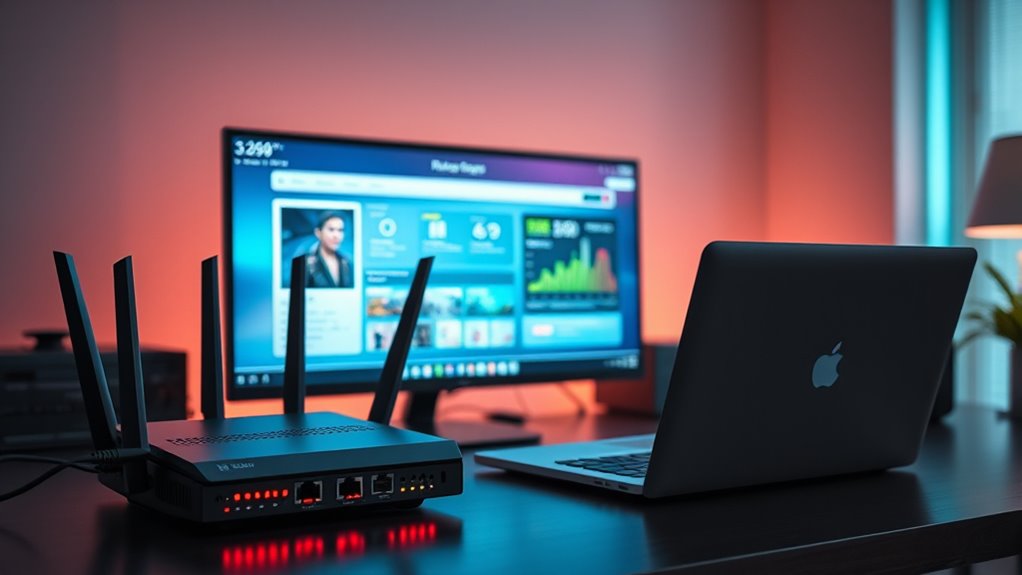
Your VPN speed can be considerably affected by the hardware and network setup you’re using. Hardware limitations, like an outdated router or insufficient processing power, can slow down your connection because they struggle to handle encryption and data transfer efficiently. Network congestion also plays a big role; when many devices share your network or your ISP experiences high traffic, your speeds can drop markedly. Additionally, weak Wi-Fi signals or using a wired connection with poor cables can create bottlenecks. These issues cause latency and reduce throughput, making it harder to stream 4K content smoothly. To improve VPN performance, ensure your hardware is up-to-date and your network isn’t overwhelmed. Optimizing these conditions helps maintain higher speeds and reduces disruptions during streaming.
Choosing the Right VPN Service for High-Quality Streaming
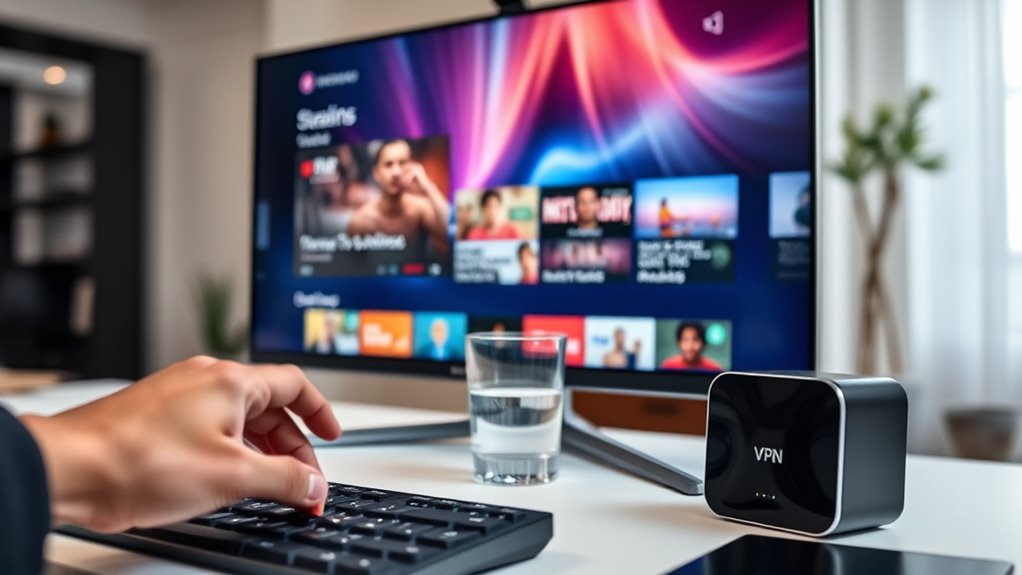
Choosing the right VPN service is essential for maintaining high-quality streaming, as not all providers deliver the same speed and reliability. When selecting a VPN, consider how well it handles VPN legalities and regional restrictions, ensuring you stay compliant while accessing content. A good VPN should offer fast, stable connections that won’t hinder your 4K streams. Visualize a VPN that:
- Bypasses regional restrictions smoothly, letting you access geo-blocked content
- Maintains high speeds despite encryption, supporting seamless 4K playback
- Upholds strong privacy policies to protect your data and adhere to VPN legalities
Research providers that prioritize speed and reliability, and check their ability to unblock streaming services without risking legal issues. The right VPN makes high-quality streaming effortless and secure.
Tips to Optimize VPN Settings for Seamless 4K Playback
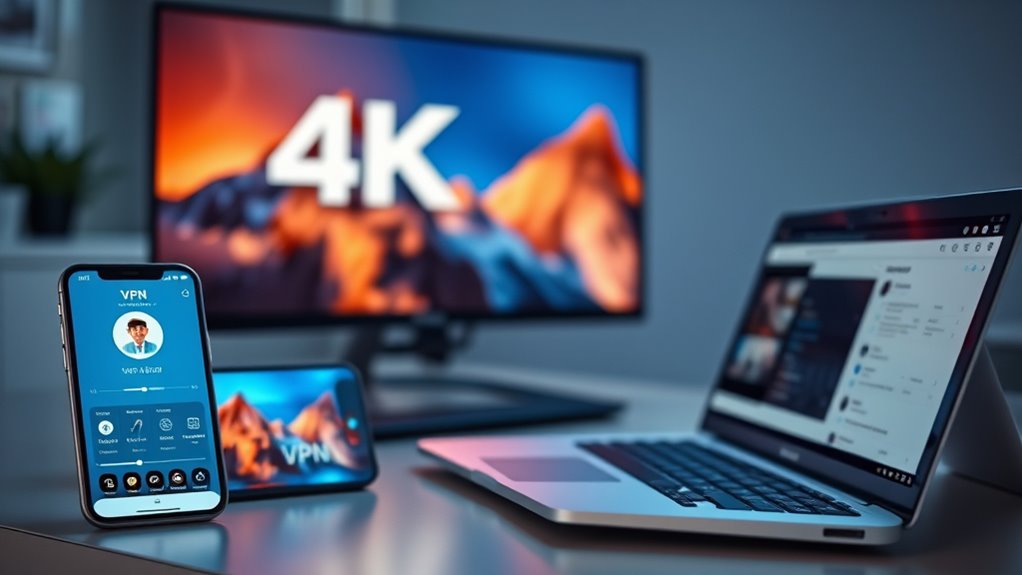
Optimizing your VPN settings can substantially improve streaming quality, especially for 4K content. Start by choosing a VPN with strong encryption that balances security and speed, such as AES-256. Adjust your VPN encryption settings if possible, opting for faster protocols like WireGuard or IKEv2 instead of heavier options. Server selection is vital—connect to servers closer to your location to reduce latency and avoid congested ones that can slow down your stream. Switch servers if your connection drops or buffering occurs. Disable features like double VPN or obfuscation if they’re not essential, as they can add latency. Regularly update your VPN app to benefit from performance improvements. These tweaks can help guarantee seamless 4K playback with minimal speed loss.
Debunking Misconceptions: Is VPN Speed Loss Inevitable?
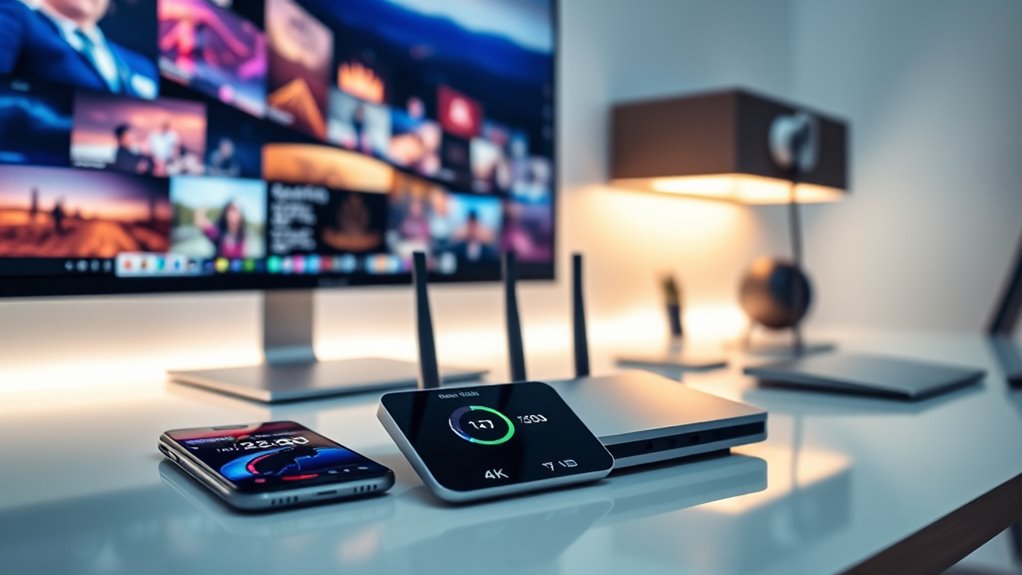
Many believe that using a VPN inevitably slows down their internet speed, but this isn’t always the case. While VPN encryption can introduce some overhead, factors like server load play a bigger role in speed loss. A heavily congested server slows your connection, regardless of encryption strength.
Imagine:
- Connecting to a nearby server with low load, ensuring minimal latency.
- Choosing VPN providers that optimize their servers for speed.
- Avoiding servers far from your location, which can cause additional delays.
Speed loss isn’t solely due to VPN encryption; it’s often about how many users share the server and its overall capacity. With the right setup, you can enjoy secure browsing without sacrificing your 4K streaming quality.
Frequently Asked Questions
Can VPNS Improve Streaming Speeds in Some Cases?
You might wonder if VPNs can improve your streaming speeds. While VPN encryption usually adds some overhead, choosing a server close to your location can reduce server latency, sometimes resulting in faster connections. In certain cases, a VPN can bypass network congestion or throttling, enhancing your 4K stream quality. Just remember, the right setup and server selection are key to realizing these potential speed benefits.
How Does VPN Protocol Choice Affect 4K Streaming Quality?
Your VPN protocol choice directly impacts 4K streaming quality by affecting encryption strength and server performance. Opting for a protocol with strong encryption guarantees your data stays secure, but it might slow your connection. Meanwhile, selecting a server closer to your location reduces latency and buffering. Balancing encryption strength with server proximity helps you enjoy smooth 4K streams without sacrificing security or speed.
Do Free VPNS Cause More Speed Loss Than Paid Ones?
Imagine a rushing river, clear and swift, representing your internet speed. Free VPNs act like tiny dams, causing speed throttling and reducing flow. They often cause more speed loss than paid VPNs because they lack the bandwidth and advanced protocols of paid options. With free VPNs, you risk slower connections, buffering, and poor 4K streaming quality. Investing in a paid VPN keeps your stream flowing smoothly, just like a well-maintained river.
Is There a Way to Measure VPN Impact on Streaming Bandwidth?
You can measure your VPN’s impact on streaming bandwidth through speed testing and bandwidth measurement tools. Run tests both with and without the VPN active, noting download and upload speeds. This comparison reveals how much your VPN affects your connection. Use reliable services like Ookla Speedtest or Fast.com to get accurate results. Regular testing helps you understand your VPN’s performance and optimize your streaming experience.
Does Using a VPN Affect Other Devices Connected to the Network?
Using a VPN can impact other devices connected to your network through network congestion and device interference. When you connect a VPN, it might increase the overall bandwidth usage, causing slower speeds for all devices. Additionally, if multiple devices are streaming or downloading simultaneously, they can interfere with each other’s performance. To minimize this, guarantee your network has sufficient bandwidth and avoid heavy usage on multiple devices at once.
Conclusion
Remember, a reliable VPN isn’t a barrier but a bridge to better streaming. Like a lighthouse guiding ships through stormy seas, the right settings and choices can clear the fog of speed loss. Don’t let myths anchor you down—trust in the technology and your adjustments. With patience and knowledge, your 4K streams can flow smoothly, turning the digital storm into a calm, crystal-clear voyage. Your perfect streaming experience awaits just beyond the horizon.
